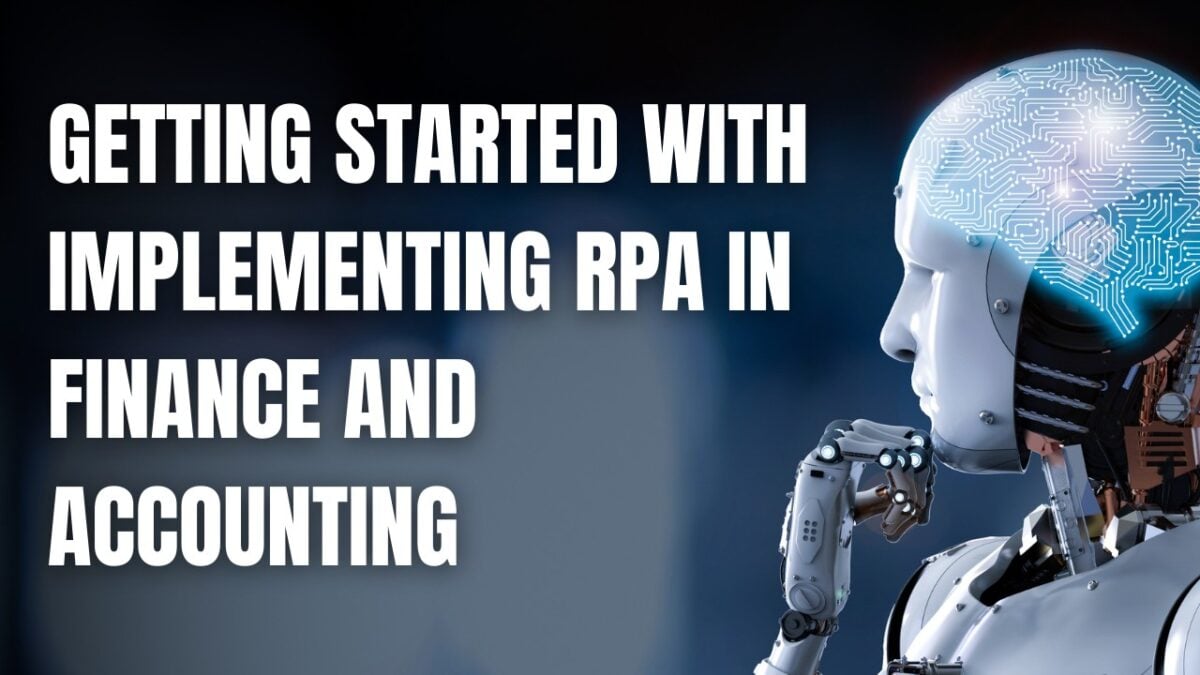Getting Started with Implementing RPA in Finance and Accounting

In the modern business landscape, organizations continually seek ways to improve operational efficiency and drive productivity. One of the transformative technologies making this possible is Robotic Process Automation (RPA). Particularly in the finance and accounting sector, RPA is poised to revolutionize how tasks are performed, shifting the focus from manual, repetitive tasks to more strategic functions.
To ensure a successful RPA implementation and mobile application development, proper change management and employee training are imperative. Employees need to understand the benefits of RPA and mobile apps, as well as how their roles may evolve in this digital transformation journey. Clear communication channels and ongoing support should be established to address any concerns or challenges that arise during the transition.
The Impact of RPA on Finance and Accounting

Finance and accounting are two departments within a business that often require significant manual data processing. RPA is especially effective in these areas, transforming time-consuming processes into automated workflows. By automating tasks such as data entry, reconciliation, and report generation, finance professionals can focus their attention on higher-value tasks like analysis, forecasting, and strategic decision-making.
Unleashing the Potential of RPA in Finance and Accounting
RPA’s ability to take over repetitive tasks not only saves time but also increases the accuracy of the outcomes. Automated processes have a lower risk of errors compared to manual operations, reducing the likelihood of inaccuracies in critical financial reports.
ROI and Accuracy Improvements
By automating finance and accounting processes, organizations can reap substantial returns on investment (ROI). Examples of such processes include purchase order entry and credit note processing. RPA can execute these tasks more quickly and with fewer errors than manual processing, resulting in significant cost savings and improved financial reporting accuracy.
Efficiency in Spreadsheet Management
RPA also shines in managing spreadsheets, a common tool in finance and accounting. Whether it’s updating figures, performing calculations, or creating graphs for reporting, RPA agency can automate these tasks, enhancing efficiency and allowing finance professionals to focus on interpreting the data rather than manipulating it.
Background Processing Capabilities
One of the significant advantages of RPA is its ability to perform tasks in the background. This feature is especially beneficial in finance and accounting, where certain processes can be automated and executed outside of regular business hours, further increasing operational efficiency.
Starting Your RPA Journey in Finance and Accounting
For those interested in entering the RPA industry or professionals seeking to upskill, several resources can help you get started.
Learning with UiPath Academy
UiPath Academy offers a range of courses designed to equip learners with the skills necessary to implement RPA. By taking these courses and building a portfolio, beginners can increase their employability in the rapidly growing RPA industry.
Low Entry Barrier
The entry barrier for learning RPA is relatively low. Companies like UiPath offer free downloads and learning materials, making it easy for anyone to start learning and implementing RPA. This accessibility makes RPA a fantastic tool to add to your skill set and a potentially career-defining move.
Conclusion:
As the finance and accounting sectors continue to evolve, the implementation of RPA becomes increasingly crucial. By automating repetitive tasks, professionals can shift their focus to strategic roles, driving the organization’s growth and profitability. With its significant ROI, improved accuracy, and efficiency in task execution, RPA is set to be an integral part of the future of finance and accounting.
Taking the plunge into RPA does not require extensive technical knowledge, making it accessible to all interested parties. By leveraging resources like UiPath Academy and the abundance of free learning materials available, anyone can kickstart their RPA journey.
With its array of benefits and easy implementation, RPA is undeniably a game-changer in finance and accounting. Embracing this digital revolution will not only boost individual career prospects but also propel organizations towards a future characterized by increased efficiency and strategic focus.

